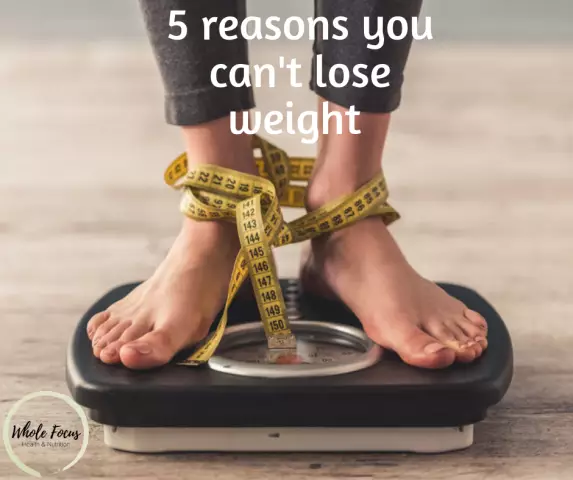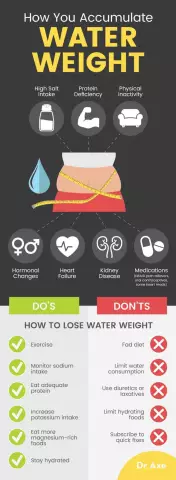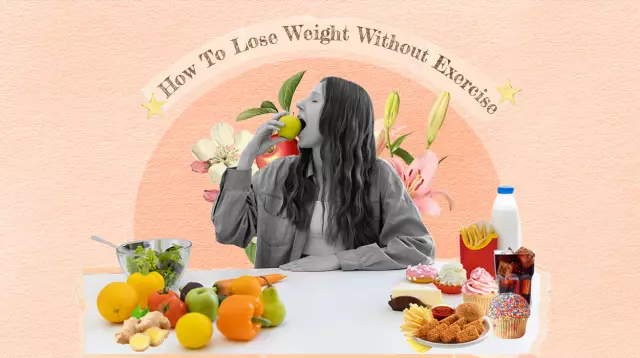- Author Rachel Wainwright wainwright@abchealthonline.com.
- Public 2023-12-15 07:39.
- Last modified 2025-11-02 20:14.
Can you lose weight without strict dietary restrictions?
According to the World Health Organization (WHO), the number of obese people worldwide has more than tripled over the past 40 years. The problem was widely publicized with the support of doctors, the media and world stars, because as the body mass index increases, the risks of cardiovascular diseases, diabetes and many others increase. It is hard to deny that with such a "hype" literally in the last couple of decades, we began to perceive overweight as a disease, and normal or even underweight as a guarantee of health. Is this fair? In pursuit of the ideal waist, diets are becoming more extreme and often dangerous, instead of healing and prevention, the body is depleted, chronic diseases are aggravated or even new ones appear.

Stop playing yo-yo
Are you trying to lose weight for as long as you can remember? The problem many people face when dieting is the so-called yo-yo toy effect, where people lose weight repeatedly and then regain their previous weight. This process is repeated over and over again, becoming a vicious circle. As you lose fat, your appetite increases as your body tries to replenish its stores of energy. Sudden and frequent weight loss can ultimately lead to fatty liver, high blood pressure, and even diabetes and heart disease. Extreme weight loss is dangerous for your brain, heart, liver, and kidneys. These vital organs need carbohydrates and calories to do their job, and without adequate nutrition, they are at risk of damage.
One of the main reasons for the yo-yo effect is severe calorie restriction and fasting. This promotes rapid weight loss by reducing muscle mass rather than fat. When muscle mass decreases, the body automatically adapts by slowing down the metabolism (metabolism). In fact, the researchers speculate that it is this lower metabolism that may explain why people gain weight again when they quit their calorie-restricted diet. Over time, it becomes more and more difficult to continue to lose pounds.
Instead of grueling dieting, make small, permanent lifestyle changes to break the cycle. You don't need a sprint race, but a long term solution. Choose small, realistic goals, such as losing one and a half to two pounds in a month. Walk more, add light physical activity. Instead of a diet of 1,000 calories or less per day, reduce your portions a little, or swap out any fried food for a high-fiber diet. Keeping a food diary is helpful at first, but don't get carried away.
Diet depression is not fiction
Health is not only about physical well-being, the connection between diet, its medicinal properties and the risks of mental disorders has been studied for a long time. Nutritional psychologists and psychiatrists have appeared, diets for people with epilepsy, anorexia, or depression have been developed and successfully applied. Interestingly, diet can both help and worsen the symptoms of depression. Stress is another factor that can be associated with a strict restrictive diet, it negatively affects your sleep, dramatically decreases willpower, provoking "breakdown" and overeating. Scientists even identify "diet thinking" in which you are too busy with your weight, watch your calories and constantly focus on what you can eat and what is strictly forbidden. Sound familiar?
Instead of just enjoying the here and now, this kind of thinking is too intrusive and can even make you lose control of your life and health. Then it's probably best to give up that mindset and stop focusing on your weight and start making yourself stronger. Unfortunately, “letting go of the situation” does not mean eating more of these soft French rolls. Some foods enter the intestines but are ultimately toxic to your mental balance. Blood sugar spikes after eating fast carbohydrates are responsible for anxiety. Most importantly, it's not enough to just eat well: you need to consume all the nutrients and fiber your body needs and avoid significant consumption of refined and over-processed foods.
How to eat right?
Trillions of microorganisms, such as bacteria and yeast, live in the human gut, creating what is called the microbiome. This microscopic community helps convert tryptophan from protein foods into the happiness hormone serotonin. As you can see, your eating habits are directly related to your mood. Fasting diets that are limited in protein, fiber and vitamins disrupt the balance of the microbiome, which also serves as a barrier function of the intestinal wall. An unhealthy gut lining loses its ability to serve as an impenetrable barrier to toxins. Symptoms of chronic fatigue, migraines, mood swings and skin conditions appear.
You can encourage and maintain your microbiome by consuming fermented foods like sauerkraut, kefir or yogurt, as well as fiber from many different plant sources. Unfortunately, the dietary plan does not always include enough fiber. Many fruits and vegetables are prohibited on low-carb diets or for gastrointestinal problems. The introduction of additional sources of dietary fiber from the line of dietary supplements can provide invaluable assistance. An excellent example is the modern natural remedy Fibraxin. The vegetable dietary fiber in the composition acts as a prebiotic, gives a feeling.
Fibraxin contains two important components - dietary fiber (arabinogalactan) and an iron-binding protein (lactoferrin), which help to normalize bowel function. Arabinogalactan is a soluble dietary fiber that is essentially a prebiotic that helps support and grow the correct intestinal flora. During the fermentation of arabinogalactan by beneficial bacteria, propionate, acetate and butyrate are formed, which have important properties. Propionate binds to receptors in colon cells where it stimulates the release of appetite-reducing hormones called anorectic hormones. Acetate is a source of energy for maintaining muscle, heart and brain function - this is important because weakness, distraction and fatigue are frequent companions of any diet. Butyrate is essential for nourishing and renewing colon cells and restoring an impenetrable barrier to allergens and other harmful substances. Interestingly, acetate, butyrate, and propionate do not enter the body with food; they need sufficient dietary fiber and a healthy gut microbiome to synthesize them.

Lactoferrin inhibits the growth of pathogenic bacteria, making room for beneficial microflora. Lactoferrin "takes" iron from pathogenic bacteria, and thereby limits their chances of survival and reproduction. Lactoferrin is also a local immunity stimulant, preventing allergens and toxins from entering the bloodstream.
The convenient form of taking Fibraxin - just 1 sachet per day with meals, makes life much easier during a diet, contributing to a comfortable bowel movement and regular bowel movements.
Fibraxin is not a medicine or a means for losing weight, does not have a therapeutic effect, but it makes it easier to tolerate a diet and get rid of extra pounds. It is important to take Fibraxin throughout your diet.
Instead of a conclusion
The World Health Organization claims that healthy food is a diverse combination of grains, legumes, fruits, vegetables, and animal protein foods. Experts believe it protects against many chronic noncommunicable diseases such as heart disease, diabetes and cancer. For lifestyle changes, WHO suggests eating more vegetables and fruits, less salt, sugar and industrial fats.
Eating a healthy diet does not involve strict restrictions, does not require being unrealistically thin or depriving yourself of your favorite foods. Rather, it is wellness, more energy, health, and mood. Of course, by taking the path of good nutrition, you will not lose weight in three or seven days, as extreme diets guarantee. But the weight will go away irrevocably, bypassing the yo-yo effect, and the body will be grateful to you.
Found a mistake in the text? Select it and press Ctrl + Enter.






